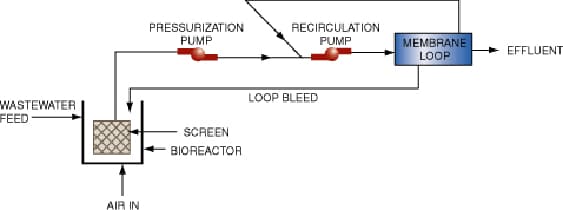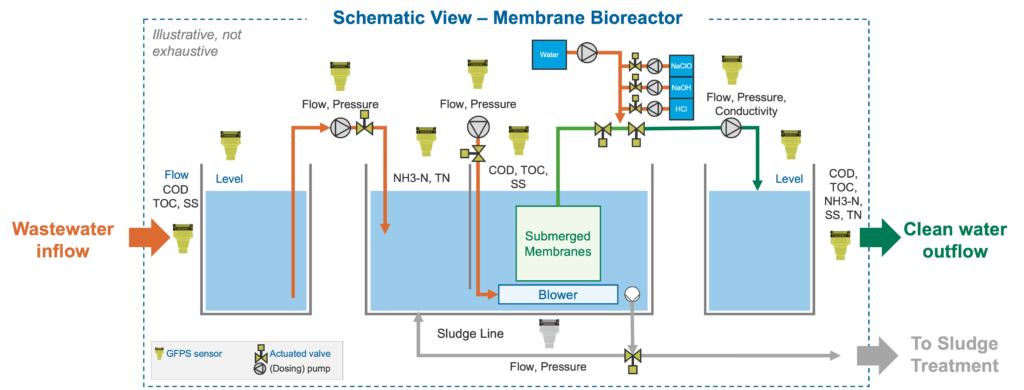Just How Membrane Bioreactors Are Transforming Water Filtration Systems
The emergence of membrane layer bioreactors (MBRs) stands for a considerable innovation in the field of water filtration, combining biological therapy procedures with advanced membrane layer filtration innovations. This assimilation not only improves the top quality of treated effluent however likewise addresses city space restrictions, making MBRs especially appropriate for largely booming areas. As worldwide water deficiency heightens, the duty of MBRs in facilitating drinkable water reuse and lasting water administration becomes progressively important. The ramifications of this modern technology expand past performance-- what opportunities and challenges lie in advance for its widespread application?
Summary of Membrane Bioreactors
Membrane layer bioreactors (MBRs) stand for a considerable development in water filtration modern technology, as they integrate biological therapy procedures with membrane purification. This assimilation improves the efficiency of wastewater therapy by using microorganisms to weaken natural pollutants while at the same time using semi-permeable membrane layers to separate cured water from suspended solids and pathogens.
The MBR system usually includes an organic reactor where the microbial populace metabolizes contaminants, adhered to by a membrane purification system that retains biomass and enables only tidy water to pass through. This double functionality causes higher effluent high quality compared to traditional therapy techniques. MBRs can be run in both set and constant circulation modes, using flexibility in style and application.
They likewise allow the recuperation of water for reuse, hence contributing to water sustainability initiatives. In general, MBRs are at the leading edge of enhancing water therapy performance and top quality, showcasing the possibility for innovative solutions in environmental management.
Advantages of MBR Technology
The combination of biological treatment with membrane filtration provides various advantages for water purification processes. One of the primary advantages of Membrane layer Bioreactor (MBR) modern technology is its capacity to properly get rid of both inorganic and organic contaminants, resulting in premium effluent. The membranes act as a physical barrier, preventing put on hold solids and virus from going through, which improves the overall safety and integrity of cured water.
Furthermore, MBR systems require a smaller impact compared to conventional therapy approaches, permitting much more efficient room use. This small design is specifically helpful in urban setups where land is restricted. MBRs also show operational versatility, accommodating differing influent high qualities and circulation prices without significant efficiency deterioration.
Furthermore, the procedure provides boosted nutrient removal capabilities, especially for nitrogen and phosphorus, which are crucial for preventing eutrophication in getting waters. The decreased sludge manufacturing associated with MBR modern technology likewise converts to reduce disposal prices, making it an economical solution over time - Membrane Bioreactor. On the whole, the benefits of MBR technology setting it as a leading choice for sustainable and cutting-edge water purification systems, dealing with both ecological and economic worries
Applications in Water Filtration
Applications of Membrane Bioreactor (MBR) innovation in water filtration are impactful and diverse, resolving various treatment requires throughout multiple markets. MBRs properly combine biological therapy procedures with membrane filtering, making them excellent for municipal wastewater treatment, commercial effluent monitoring, and also potable water reuse efforts.
In community settings, MBRs are progressively utilized to improve the high quality of dealt with wastewater, enabling for conformity with rigid discharge guidelines and promoting the recycling of water for watering and non-potable usages. Their small style likewise makes them appropriate for metropolitan atmospheres where space is limited.
Industrially, MBR technology is utilized to deal with procedure water and wastewater, especially in markets such as food and beverage, pharmaceuticals, and textiles. By properly getting rid of go to my site pollutants and suspended solids, MBRs help industries minimize ecological influences while recuperating important resources from wastewater streams.
Moreover, MBRs are obtaining grip in decentralized water treatment applications, where small systems can be released in remote areas or developing areas. This adaptability allows communities to attain lasting water administration solutions, boosting access to clean water while lowering reliance on traditional therapy techniques.
Case Researches and Success Stories

In another instance, a fabric production center in Bangladesh took on MBR innovation to address its wastewater challenges. The system lowered chemical oxygen demand (COD) levels from 1,200 mg/L to much less than 100 mg/L, thus satisfying governing criteria and dramatically decreasing environmental influence.
The College of Cape Community's MBR installment has verified efficient in dealing with greywater for non-potable reuse on campus. This project not just preserves safe and clean water but additionally works as an instructional version for sustainable techniques.
Additionally, a seafood handling plant in Norway made use of MBR modern technology to deal with effluents consisting of high degrees of raw material, accomplishing over 90% contaminant elimination. These situation studies underscore MBR innovation's flexibility and its important function in boosting water high quality throughout diverse applications.
Future of Water Treatment Solutions
As global water shortage and pollution difficulties escalate, innovative water treatment options are ending up being increasingly important to make certain sustainable accessibility to clean water. The future of water treatment depends on the assimilation of advanced innovations that improve the performance and efficiency of purification processes. Membrane bioreactors (MBRs) are at the center of this development, integrating organic therapy with membrane purification to create top quality effluent ideal for various applications.

Emerging fads such as resource recuperation from wastewater, including nutrients and energy, will certainly better change treatment centers right into green centers. Additionally, developments my latest blog post in nanotechnology and membrane layer materials assure enhanced performance and durability of purification systems.

Conclusion
Their role in safe and clean water reuse and sustainable water administration highlights their significance in resolving worldwide water shortage difficulties. Continued research and advancement will further improve the efficiency and fostering of MBR modern technology, ensuring a resilient future for water therapy services.
The emergence of membrane layer bioreactors (MBRs) represents a substantial innovation in the field of water filtration, merging organic therapy procedures with innovative membrane filtration technologies. As global water deficiency increases, the duty of MBRs in promoting drinkable water reuse and lasting water monitoring ends up being significantly important. They likewise enable the recuperation of water for reuse, thus contributing to water sustainability efforts.As global water scarcity and air pollution difficulties magnify, ingenious water treatment solutions are coming to be progressively Bonuses vital to guarantee lasting accessibility to clean water. Their role in safe and clean water reuse and lasting water administration highlights their significance in resolving global water shortage difficulties.